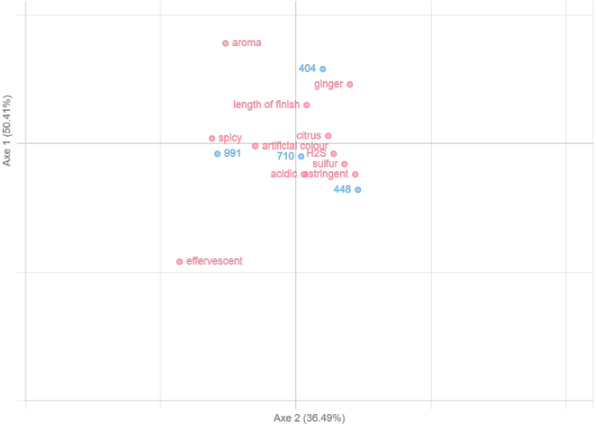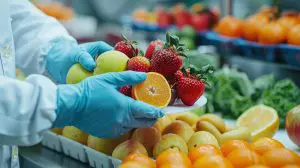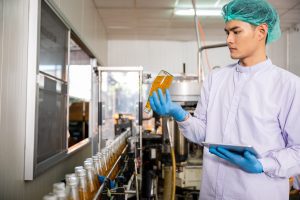Like other fermented beverages, kombucha suits itself well for sensory evaluation. This trendy drink is a black tea-based, non-alcoholic beverage fermented by yeast and bacteria and known for its refreshing scent and taste. Sought after for its health benefits, kombucha is a low-calorie product, is rich in antioxidants, and offers antimicrobial and anti-inflammatory properties. It presents a complex sensory profile where texture, aroma, hue, and flavour may be assessed to ensure the beverage is balanced and pleasing to consumers. Like all products of biotechnology, it can display off-flavour and aroma profiles which must be avoided (See Kombucha Aroma Wheel from the International Kombucha Brewers). Like in beer and winemaking, close monitoring of the brewing process is key to delivering a winning product.
Opened in September 2022 in Kelowna, the kombucha bar from MotherLove Ferments offers all organic, high probiotic count kombucha with no artificial flavours. Owner and kombucha master Rochelle Minagawa reached out to Sirocco Consulting to discuss food safety and ended up talking sensory. Since we are both interested in sensory marketing and consumer research, we organized a blind tasting of ginger kombucha to gauge the quality of her products against direct competitors.
MotherLove Ferments sells four standard kombucha flavours: Lavender Lemonade, Blue Alchemy, Holy Hibiscus, and Just Ginger. They also market four standard flavours of water kefir, kombucha’s non-caffeinated cousin.
The brewing staff at Motherlove and a few friends and family members (panel of 7 tasters) gathered in the bar tasting room to perform a descriptive test of four ginger Kombuchas. We chose the Pivot© sensory test and data was analyzed with Tastelweb Software. Aroma wheels were distributed to the panel which could look up aromas, flavours, and defects during the evaluation.
Kombucha Flavor Family

One of the advantages of using the Pivot © test for descriptive analysis is that training on defined sensory descriptors is not required, saving a lot of time. Instead, tasters use their own words to describe the sensory attributes of the beverages, creating a dictionary of sensory terms. The panel coordinator reviews the descriptors and groups the synonyms. While the main goal is to identify the attributes that are commonly used by the panel, it is also to review lesser-used terms that may describe the sensory profile of kombucha more completely (ex: off-notes or defects, aroma wheel sub-categories, and descriptors). The “lexical analysis” is then saved in the Tastelweb database and statistics are generated based on the frequency of responses for descriptive terms and their synonyms. The Correspondence Factor Analysis (CFA) is one graphical output that is automatically created following the tasting (see plot below). The sensory map shows all 4 kombucha products (blue numbered dots) and the descriptors that best match their profiles. If you live in the Kelowna area, you will have to come to the tasting bar and try to guess which kombucha Motherlove brews and sells. We can give you a hint: their kombucha is not described as “reductive” or “acidic”.
The competitor analysis identifies clear main sensory attributes for the product category. As the CFA shows, these beverages can be quite effervescent, strongly flavoured, and coloured with some astringency and a long finish on the palate. They can also display some acidity and off-notes, such as sulfur, or vinegar.
For the kombucha master brewer, it is important to taste the product blind and get feedback from the team to improve quality and flavour in-house. Rochelle and her brewing team took note of improvements that they could make to stay true to her brand of 100% organic and natural kombucha. While the other products stood out and differed from hers, her kombucha could benefit from minor process adjustments that may increase sales (data not shown). In addition to descriptive sensory tests, Rochelle could also gather consumer sensory data easily by implementing consumer tests in Tastelweb. The tasting bar is the perfect venue to ask patrons to leave a sensory review by scanning a QR code. With a global kombucha market size valued at USD 2.64 billion in 2021, being able to easily and quickly monitor the sensory quality of kombucha gives a clear competitive advantage to master brewers who want to stay attuned to the taste of their products and at the same time keep an eye on the competition.

Correspondence Factor Analysis (CFA) for 4 Ginger kombuchas identified by random numbers and 11 sensory descriptors.
We asked Rochelle about her experience of blind tasting.
Is tasting important in Kombucha manufacturing?
Tasting is VERY important in Kombucha manufacturing.
How was your experience of the Pivot© tasting?
The pivot tasting provided a good opportunity to really see what flavours were prominent in ours and other brands and what was preferable.
Any other comments/feedback?
We know from customer feedback that many people say our kombucha has a lighter flavour and they prefer it to competitors’ acidic brands. However, the feedback did surprise me and it is interesting to see how people reacted to the side-by-side blind tasting. Even within our team, we often try other brands and the feedback from the blind tasting was different than when we taste them in a more casual setting from the original packaging.
We would definitely be interested in doing more blind tastings.
References
- The chemistry and sensory characteristics of new herbal tea-based kombuchas
- Tastelweb Software
- Motherlove Ferments
Sirocco Food + Wine Consulting offers sensory training and consulting services. We represent Tastelweb® in Canada and the United States. Karine Lawrence and Tastelweb® will attend the 15th Pangborn Sensory Symposium in France this summer.






